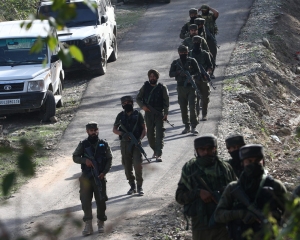The UK government on Monday announced a relaxation of recruitment criteria to allow Commonwealth nationals to apply for jobs in its armed forces in order to meet a shortage in its ranks.
The UK's Ministry of Defence (MoD) laid out the proposals in a written ministerial statement (WMS) before Parliament, which involves a waiver of the current requirement of a minimum of five-year residency in the UK for applying to join the country's Army, the Royal Navy or the Royal Air Force.
This would open up the forces to recruits who have been based in countries like India, Australia, Canada and Kenya and meet the necessary recruitment criteria for the service and role they wish to join.
"We have now decided to remove the five-year UK residency criterion for Commonwealth citizens and increase recruitment to 1,350 across the Royal Navy, British Army and Royal Air Force (RAF)," the MoD statement said.
"Applications will be accepted from all Commonwealth countries, although in order to mitigate the risks associated with unaccompanied minors travelling to the UK without the guarantee of a job, we will not be accepting applications from those under 18," the statement adds.
A limited waiver to the residency requirement was introduced in May, 2016 to recruit up to 200 Commonwealth personnel per year to fill skill shortage posts.
This limited waiver has now been widened, with the RAF and Royal Navy beginning recruitment of Commonwealth applicants right away and the British Army to accept such applications from early 2019. Applications from citizens of countries outside the Commonwealth will not be accepted.
The Commonwealth is an association of 53 independent states, including India, mostly former territories of the British Empire.
"Citizens from the Commonwealth have a long tradition of serving with distinction in the armed forces," the MoD said.
Special rules already allow citizens of Ireland and Gurkhas from Nepal to join the British armed forces. The five-year UK residency requirement for Commonwealth recruits was first waived in 1998, before being reintroduced in 2013.
UK Minister for the Armed Forces, Mark Lancaster, said, "As an outward-looking nation, Britain has always counted on the dedicated service of our friends from the Commonwealth to keep this country safe".
"From Australia to Jamaica, to Fiji and South Africa, Commonwealth recruits are already playing a key role in our Armed Forces. So we're stepping up the numbers of recruits from the Commonwealth, knowing that they will bring key skills and dedicated service to our military. Their different perspectives will also help us to enhance our cultural understanding, giving us an operational advantage over our adversaries," he said.
Of the 1,350 new annual recruits, the Army is expecting to hire around 1,000 personnel, with the Royal Navy and the RAF expecting to recruit around 300 and 50, respectively.
A National Audit Office (NAO) report had revealed in April this year that the UK's armed forces are short of around 8,200 soldiers, sailors and air personnel. Among measures to meet this shortage, women are now allowed to apply for all roles in the British military for the first time in history.
Britain currently employs 4,500 Commonwealth citizens in the armed forces, with 3,940 in the Army, 480 in the Royal Navy and 80 serving in the RAF.
























